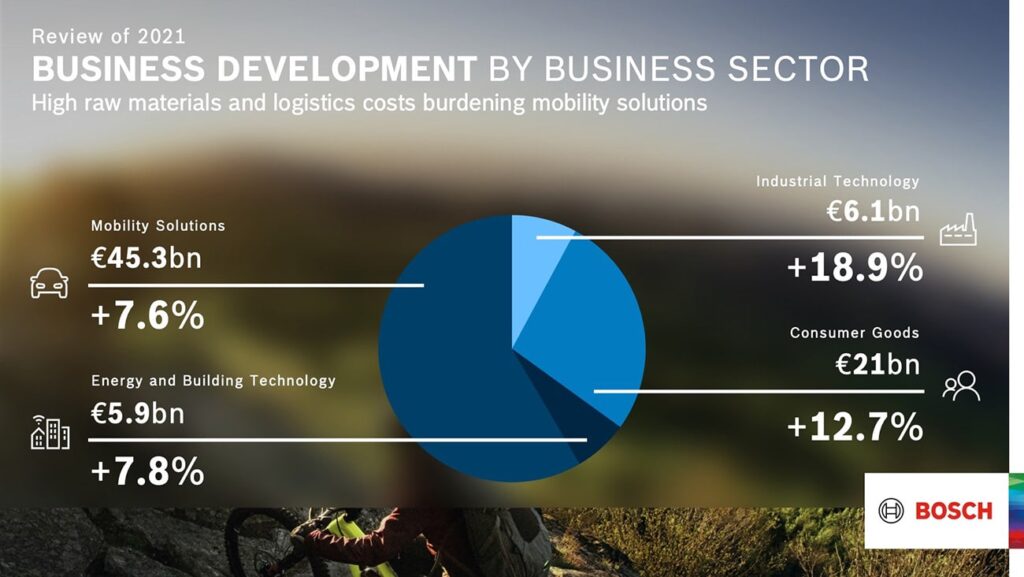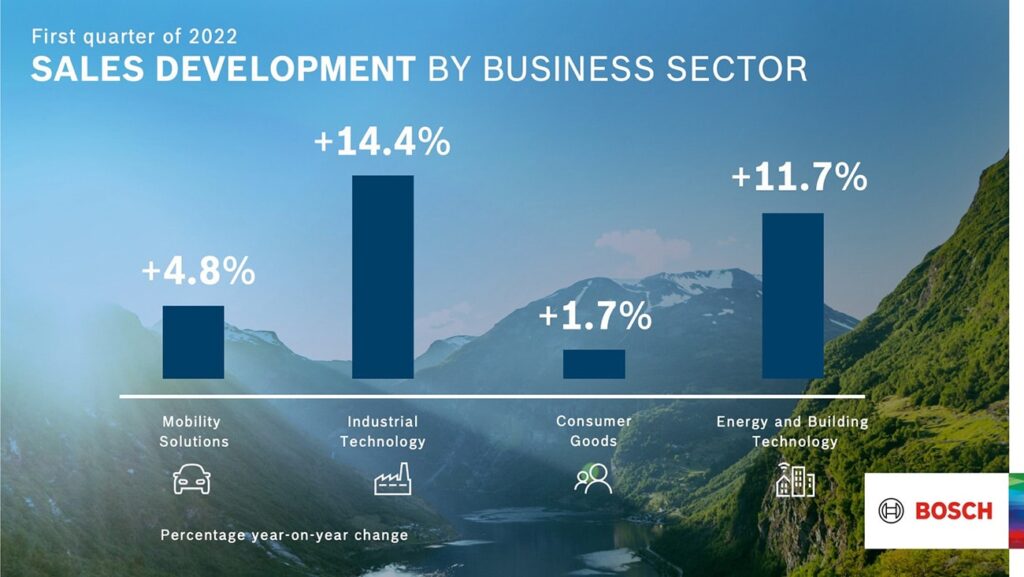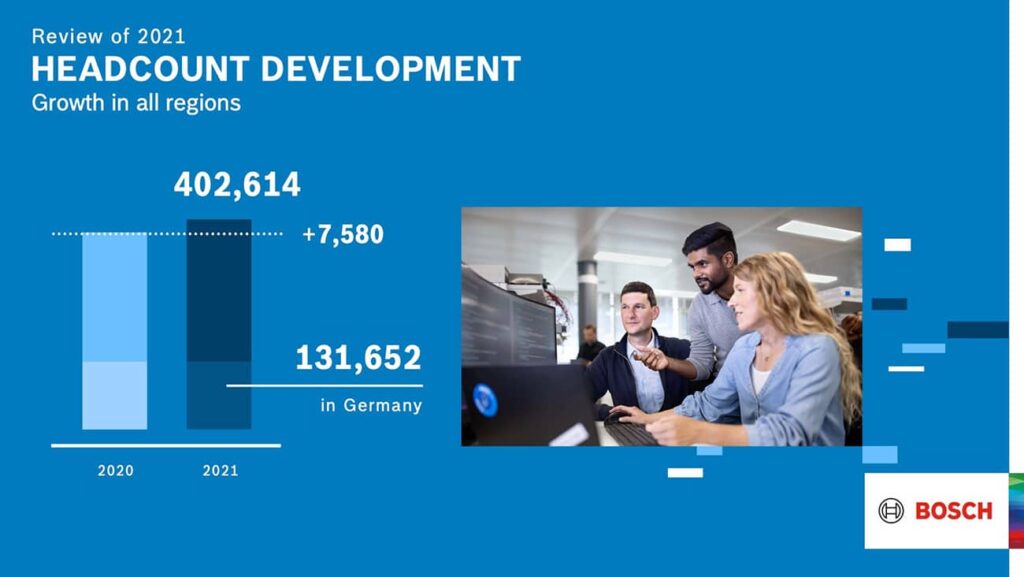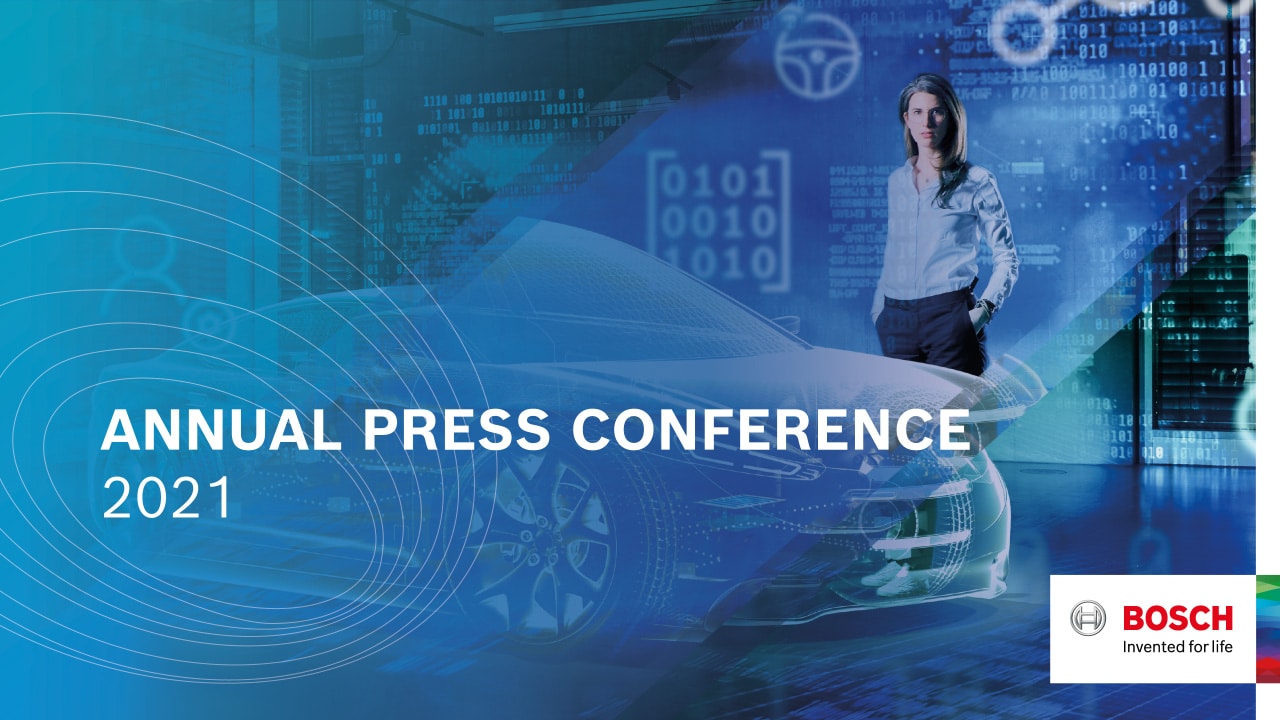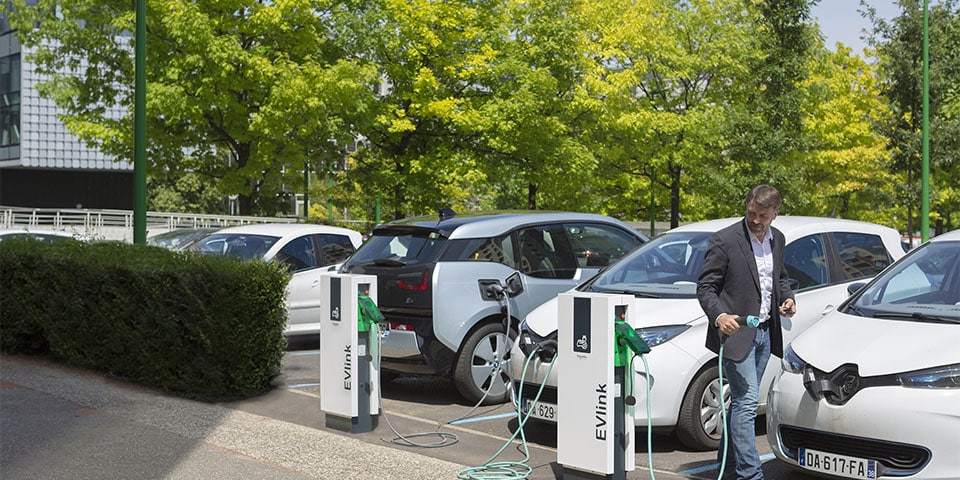
Bosch invests billions in climate-neutral technology
Successful 2021 financial year - Uncertainties and cost increases weigh on outlook for year ahead
- 2021: Turnover: €78.7bn/Result: €3.2bn.
- Entry into the 14-billion-euro hydrogen electrolysis market - Bosch is investing almost 500 million euros in this new business activity until 2030.
- Order volume for electromobility rises above 10 billion euros for the first time.
- Stefan Hartung: “Electrification is the fastest way to climate-neutral living.”
- Markus Forschner: “Bosch has met the challenges of 2021 - but the performance pressure is increasing.”
- Filiz Albrecht: “In these times of change, we are assuming our social responsibility by assigning as many employees as possible to new business activities.”
- Christian Fischer: “Bosch will invest 300 million euros in the heat pump sector by 2025.”
- Rolf Najork: “Connected energy management leads to energy efficiency in factories.”
- Markus Heyn: “Bosch is the leading supplier of electric drives on the road.”
In fiscal year 2021, Bosch achieved a significant increase in sales and profits despite difficult conditions. The technology and service company's revenue rose 10.1 per cent to 78.7 billion euros, and operating profit before interest and taxes (operating EBIT) increased by more than half to 3.2 billion euros. Operating EBIT margin rose to around 4 per cent, up from 2.8 per cent in the previous year. “The successful financial year 2021 gives us confidence that we will also be able to meet the challenges of the current year,” said Dr Stefan Hartung, chairman of the board of management of Robert Bosch GmbH when presenting the annual results.
The war in Ukraine with all its consequences is one of the major uncertainties. The company takes its responsibility for its employees particularly seriously and has been providing extensive humanitarian aid since day one of the war, especially to alleviate the suffering of refugees. “Our thoughts are with the people fighting to survive, and we share their fears,” says Hartung. War is not a means to resolve political conflicts. According to Hartung, the current situation illustrates the urgent need for politicians and society to act to reduce dependence on fossil fuels. To do this, they need to take decisive action to develop new energy sources. This is why the Bosch Group continues to make consistent efforts to protect the climate, despite the challenging economic climate. In this context, the Bosch chairman announced investments in climate-neutral technology such as electrification and hydrogen amounting to some three billion euros over three years.
According to Hartung, the war will put a brake on the reduction of CO2 emissions in the short term, but will lead to an accelerated technological transformation in the long term, especially in Europe. “This situation may motivate politicians to be more decisive - for example, in encouraging energy-efficient building renovations, but also in bringing about a large-scale expansion of regenerative energy generation,” Hartung said. He believes that electrification is the fastest route to climate-neutral living, provided of course that green electricity is used. To this end, Bosch promotes sustainable mobility: in 2021, order volume for electric mobility at Bosch rose above 10 billion euros for the first time. However, Hartung stressed that hydrogen is also used. “The task of industrial policy should be to prepare all economic sectors for the use of hydrogen,” he believes. “Electricity-based solutions have top priority, but hydrogen-based solutions should also gain momentum. Both are needed - for a sustainable life on the blue planet.” At the same time, the Bosch chairman announced investments in the digitalisation of the company for an additional 10 billion euros over the next three years. “Digitalisation in particular can also contribute to sustainability - and our solutions start from this conviction,” Hartung said. Examples from the Bosch product portfolio include the Smart Home energy manager and the energy platform for digitised industrial production.
Outlook 2022: major uncertainties in a challenging environment
The Bosch Group experienced a 5.2 per cent increase in sales in the first quarter. “We have started 2022 well and so far we are assuming that we will exceed the 6% sales increase reported in the annual report,” said Dr Markus Forschner, managing director and CFO of Robert Bosch GmbH. “Taking into account the large amount of uncertainties, it remains difficult to make an accurate estimate for this year already now.” According to the CFO, the company will not quite be able to match its EBIT margin from last year - which should be three to four per cent. “The pressure on our results is increasing significantly, mainly due to cost increases in energy, materials and logistics.” The Mobility Solutions business sector in particular is currently facing high price pressure - prices for certain raw materials have almost tripled since 2020. “We have to be prepared for persistently high prices and particularly volatile markets,” said Forschner. “Not only car manufacturers, but also suppliers have no choice but to pass on price increases.”
Against the backdrop of the current situation, Bosch has already significantly revised its economic expectations. For the global economy, the company expects growth of almost 3½ per cent in the coming year - at the beginning of the year, the figure was still around 4 per cent. The company's earlier forecast of production of around 88 million vehicles and an expected increase of nine per cent over the previous year will also be missed. According to Forschner, the renewed impairments are caused by the corona pandemic in China and ongoing bottlenecks in the semiconductor industry. Overall, however, the CFO remains confident: “Bosch will also be able to master this difficult phase. Forward-looking products and a clear long-term strategic orientation are important - and we have both.”
Hydrogen electrolysis: entering the 14-billion-euro market
For effective climate protection, Bosch is entering the hydrogen electrolysis component business. Bosch plans to invest almost 500 million euros in this new business activity by the end of the decade, half of which will be invested by the market launch, already planned for 2025. “We have a broad base for the development of hydrogen technologies and want to promote hydrogen production in Europe,” Hartung said. “For the market of electrolyser components, we expect a global volume of around 14 billion euros by 2030.” With the stack, Bosch provides the core of hydrogen electrolysis, which combined with power electronics, sensors and a control unit will develop into a Smart Module. The stacks for H2 production should go into series production as early as 2025.
Sustainability: social responsibility at the forefront of new energies
Bosch supports the European Union's Green Deal and is particularly committed to sustainability: with its 400 locations worldwide, Bosch has been climate-neutral since 2020 and is moving much faster than planned to become an even better carbon-neutral company. Bosch could already achieve one-third of the energy savings it set itself by the end of the decade. “Sustainability is no longer an afterthought, but should be part of the core business of every company,” says Filiz Albrecht, managing director and human resources manager at Robert Bosch GmbH, responsible for the sustainability strategy. Bosch's social responsibility is situated in the triangle of economic, social and ecological interests. “Keeping the balance in this triangle is not easy. For us, social responsibility in change means taking as many associates as possible to new business activities.” According to the personnel director, Bosch is mainly developing climate-neutral technology at locations where combustion engine systems were previously produced. 1,400 associates in the Powertrain Solutions division have already been able to switch to new jobs, for example in software and electromobility, based on their qualifications or through an internal job placement platform. “By the end of the year, almost 2,300 associates will be working on mobile and stationary fuel cell systems - most of them internal associates. That is transformation - made by Bosch,” says Albrecht: “The company also plans to hire 10 000 new software developers worldwide this year, said, the human resources manager.”
Thermotechnology: €300 million for heat pump sector
“Climate protection also plays a role within our homes since more than one third of CO2 emissions come from buildings,” said Dr Christian Fischer, vice chairman of the management board of Robert Bosch GmbH, responsible for the Consumer Goods and Energy and Building Technology sectors. “The heat transition starts with the heat pump, which is ideally powered by green electricity.” At the international level, more and more legislators are setting corresponding guidelines for new buildings: in Germany alone, 65 per cent of new heating systems are to be powered by renewable sources by 2024. “Bosch will invest an additional 300 million euros in the heat pump sector by the middle of the decade,” explains Fischer: “The market will grow by 15 to 20 per cent annually until 2025. We want to grow twice as fast as the market.” Bosch also wants to do its bit in existing buildings: the company supports the conversion of natural gas heating systems to hydrogen with H2-compatible gas boilers. Moreover, connecting and integrating building systems also brings Bosch closer to its goal of generating a fundamental part of its revenue with services. “In the building systems sector, we already earn almost half of our revenues with services,” Fischer said. “Our strategic goals complement each other - they help shape climate protection from a technical perspective and expand our services.”
Industrial technology: digitisation drives energy efficiency
In industrial production, Bosch is betting on energy and cost efficiency in its factories. “Digitalisation in industrial production contributes to climate protection,” said Rolf Najork, responsible for the business sector Industial Technology. “Connected energy management alone reduces the annual energy consumption of our production by an average of five per cent.” The Energy Platform from the Industry 4.0 portfolio is already being used in 80 customer projects and at 120 Bosch locations. At the same time, the Bosch Group is focusing on electrification in industrial technology, Najork continued. By 2030, 30 per cent of mobile work machines are expected to be electrified. This corresponds to an additional market volume of EUR 1.5 billion for high-voltage drives. Bosch also wants to use industrial technology to promote electric driving. “In a project house with VW, we are busy establishing a company that will equip battery cell factories in Europe,” Najork explains. “Our common goal: to become the cost and technology leader in the industrialisation of battery production.” Experts worldwide expect a cumulative market volume of 50 billion euros in terms of battery cell production technology by 2030.
Traffic transition: electrification with battery and fuel cell drives
The EU Green Deal will give decisive impetus to the electrification of road traffic, according to Bosch. “All car manufacturers are striving to gain the largest possible share of the growing electric vehicle market,” said Dr Markus Heyn, responsible for the Mobility Solutions business sector. “Bosch sees itself as the leading supplier of electric drives for vehicles.” The company focuses on one central technical task, namely keeping the drive train including battery at the right temperature and providing the necessary climate comfort in the cabin - intelligent heat management alone increases the range of electric driving by 25 per cent. For this, Bosch has developed a pre-integrated solution with the FlexibleThermal Unit, FTU for short. With the FTU, Bosch is opening up a market that is expected to reach a volume of 3.5 billion euros by the end of the decade. For fuel cell-based electromobility, Bosch will start series production of fuel cell drives for use in trucks this year. “At the Bamberg site, we want to produce stacks with a power of one gigawatt by the middle of the decade,” Heyn looks ahead to the future. “By 2030, the cost of powering a fuel cell truck should be exactly the same as that of a diesel - that's our goal.” Bosch has again increased its investment in mobile fuel cells - to almost one billion euros between 2021 and 2024.
Financial year 2021: challenges brought to fruition - despite cost pressures
“The Bosch Group brought the challenges of 2021 to a successful conclusion,” Forschner summarises. “We were able to achieve a sales increase of 10.1 per cent and increase our operating EBIT by more than half.” We achieved this despite the still-unconquered corona pandemic, persistent bottlenecks in semiconductor supply and the significant increase in raw material prices that were already manifest in the 2021 financial year. “In addition to the good sales figures, our comprehensive set of cost-saving measures also paid off,” the CFO explained. “Our focus on the future is also reflected in the solid financial statements.” The Bosch Group's research and development expenses remained stable at 6.1 billion euros (2020: 5.9 billion euros) and investments increased slightly to 3.9 billion euros (2020: 3.3 billion euros). Research and development spending was focused on electromobility, driver assistance systems, as well as electrification in industry and heating technology. Equity rose further by 1.3 to 45.3 per cent.
Financial year 2021: development by business sector
All sectors contributed to the positive development of business activity. The business sector with the highest turnover, Mobility Solutions, recorded a 7.6 per cent increase in turnover to 45.3 billion euros. After adjusting for exchange rate effects, this is an increase of 7.9 per cent. After last year's loss, the sector achieved a slightly positive result with an operating EBIT margin of 0.7 per cent. “Mobility Solutions is particularly affected by supply bottlenecks in semiconductors and has to adapt to drastic changes in the mobility sector,” explains Forschner. “At the same time, the sector is paying high advances for electromobility and automated driving and faced significantly increased costs for raw materials and logistics.” The Industrial Technology business sector benefited from the recovery in key mechanical engineering markets and achieved sales growth of 18.9 per cent to 6.1 billion euros. After adjusting for currency effects, this represents an increase of 19.4 per cent. EBIT return was 8.4 per cent. The Consumer Goods business sector was able to increase its sales by 12.7 per cent to 21 billion euros compared to the already strong previous year, up 14.4 per cent after adjusting for currency effects. At 10.2 per cent, the sector achieved another double-digit operating EBIT return. The Energy and Building Technology business sector generated a revenue increase of 7.8 per cent after adjusting for currency effects of 8.8 per cent. The improved EBIT margin was 5.1 per cent on total sales of EUR 5.9 billion. Forschner commented, “Our climate-friendly heating technology made a significant contribution to our success.”
Financial year 2021: development by region
The Bosch Group recorded an increase in sales in all regions. In Europe, sales amounted to 41.3 billion euros, up 8.9 per cent on the previous year. After adjusting for exchange rate effects, that's 10 per cent. In North America, sales rose 6.5 per cent to 11.4 billion euros, 9.3 per cent after adjusting for currency effects. In South America, sales were 1.4 billion euros. Sales rose by 32 per cent, after adjusting for currency effects by as much as 45.1 per cent. In Asia-Pacific including other regions, sales amounted to 24.5 billion euros. That is an increase of 13.1 per cent, or 11.7 per cent after adjustment for currency effects.
Workforce figures 2021: increase in all regions
By 31 December 2021, the Bosch Group employed 402,614 associates worldwide, 7580 more than in the previous year. The expansion took place in all regions, namely Europe, the Americas and Asia. In Germany, the number of associates remained stable at 131,652. The number of employees in research and development increased by 2949 to 76,121.

